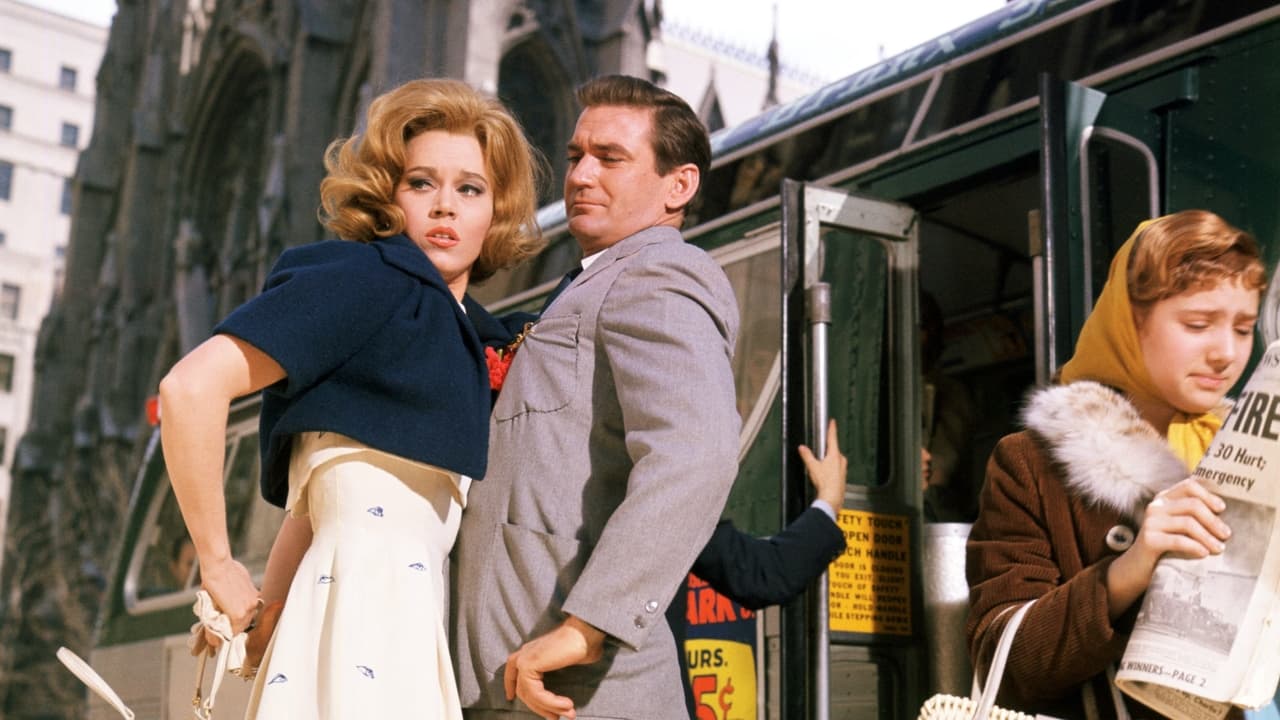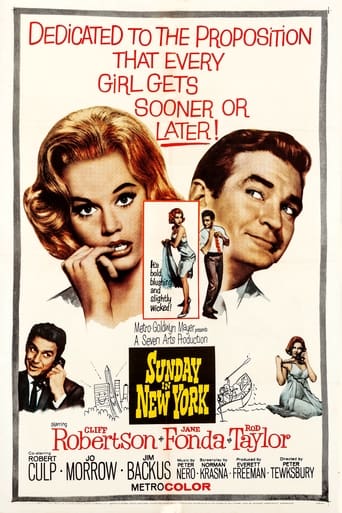

First part is full of bouncy fun as virginal Eileen (Fonda) struggles with raging hormones vs. traditional morality. Cut loose from her fiancée and roaming in New York, she and Mike (Taylor) meet cute on a bus and then try to handle their mutual attraction without admitting it. Meanwhile her pilot brother Adam (Robertson) tries to juggle a planned tryst with the luscious Mona (Morrow) with an ornery flight schedule, adding amusing results to the mix. This first part is fast-moving, clever, and adorned with many city backdrops. Then, however, things slow down in bumpy fashion once mistaken identities are added to the mix; at the same time, talk inside a single apartment set takes over.Note how the first part especially is studded with 1960's innuendo as 1934's Production Code censorship weakens. It's like the movie is flexing naughty muscles following a long 30-year jail term. Moreover, popular culture too is undergoing a similar sexual release, one soon to burst forth in a free-wheeling counter-culture. Certainly, Fonda has never been more radiant, while her spark and bounce carry the movie's main parts. To me, however, Taylor's casting as her chief romantic interest results in an awkward blend. He does his best in a farcical role, but lacks the light touch. Then too, his highly mature facial features and short stature just don't look like a maiden's dream, particularly for the bubbly Eileen. No wonder the fine dramatic actor went on to specialize in action features. On the other hand, Robertson, as Eileen's calculating brother, adds a note of beleaguered sanity to the zany occurrences, while Culp revels in the role of our girl's giddy fiancée.All in all, the movie's crux may be dated, but the mix is generally amusing; at the same time, Fonda appears to be having genuine good time.
... View MoreI discovered this movie because of Cliff Robertson. I didn't watch it then, but then when Rod Taylor passed away I rediscovered the film and had to see it. The first half of the film is like any other 1960s rom-com. It's cute, funny, etc etc. Then it takes a turn that was unexpected, but very good, about halfway through. Still it wasn't amazing or anything. While I was watching the last 20-30 minutes I was thinking about how I would write my review. BUT WAIT, there's more! ....The last 15 minutes of this movie are absolute PERFECTION! Just watch it. its amazing. Rod Taylor is great!
... View MoreYou have to make allowances for its time. What was "naughty" in 1963 is mild stuff today. Given that, it's a fun movie, thanks to a clever story, a first-rate cast, and a couple of nice songs.Cliff Robertson shows real comic timing, with Rod Taylor something of a straight man. Taylor is, as usual, a likable fellow--quite masculine but perfectly willing in this part to let himself be socked in the face a couple of times, splashed by passing trucks, and subjected to the baleful eye of Robertson as the protective big brother. Jane Fonda is just right as a young woman both virginal and luscious.The film has many ingredients hinting at the sophistication of the Kennedy era--the sophisticated bachelor apartment, Peter Nero's night club music, and especially New York as a really great place to be when you are young enough and accomplished enough to enjoy it. New York as a city infested with crime and on the verge of bankruptcy was a dozen years in the future.One notices the easy confidence of the male characters. Much would change, starting soon after the picture was made with JFK's assassination and followed by years of turmoil and grief, as well as rapid progress for women and, at least politically, for blacks. White males would never again rule the roost unchallenged.
... View MoreA diverting bedroom farce involving a cute meeting, mixed-up identities, dialog daring for the time, and Rockefeller Center.Jane Fonda, at her most succulent, bumps into Rod Taylor on a mid-town Manhattan bus, then again later, and then they get caught in a rainstorm and wind up at the apartment of Fonda's absent airline-pilot brother (Cliff Robertson). Taylor is, of necessity, attracted to Fonda but puzzled by her. She keeps insisting that her mother is also staying at the apartment -- a ploy to keep rapacious men at bay -- but Fonda and Taylor discover a black bra and negligee hanging in the closet. Mom's? No -- it belongs to roué Robertson's girl friend, whom he is at the moment chasing all over town.Jane is twenty-two years old and still, well, as she puts it, "a beginner." And her brother has insisted she stay that way. In fact, he swore to her earlier than he did not sleep with women. Now, having discovered the lingerie in the closet, Fonda decides that if it's good enough for Robertson, it's good enough for her, and she decides to seduce Taylor. It doesn't work -- because Taylor refuses to take advantage of a beginner. This, as an excuse, is akin to that used in earlier movies in which the heroine drinks too much because of her anxiety, passes out, and the hero refuses to molest her in this state.You following all this? Then it really gets twisted. Fonda's fiancé from Albany (Robert Culp) bursts in unexpectedly and mistakes Taylor for Fonda's brother. Then Robertson bursts in unexpectedly and is introduced to Culp as Taylor's co-pilot. Lots of moments that are both confusing and amusing. (If you liked "My Favorite Wife," you ought to like this. Taylor has the Cary Grant role, and he's quite good, with those upside-down ears.) Cute dialog too, with some dash for the period. When Fonda confronts Robertson with his lie under oath about never having slept with women, he pounces. "That's the loophole -- sleeping." The H-word occurs, and the V-word, and some other edgy phrases, the use of which is emphasized by the director through the use of sudden close up, indicating, "This is a shocking thing you're hearing." You get to see and hear quite a bit of Peter Nero, the Eddie Duchin of his day. You don't really get to see much of New York, though. Too bad, because in 1962, when this was shot, it had yet to deteriorate. People were clean, carefully groomed, and lived in stable neighborhoods. McSorley's Old Ale House was still exclusively male. Julius's, in the Village, was not yet completely gay, just partly gay. You could sleep in Washington Square if you didn't get caught.It all seems harmless now, and kind of fun.
... View More